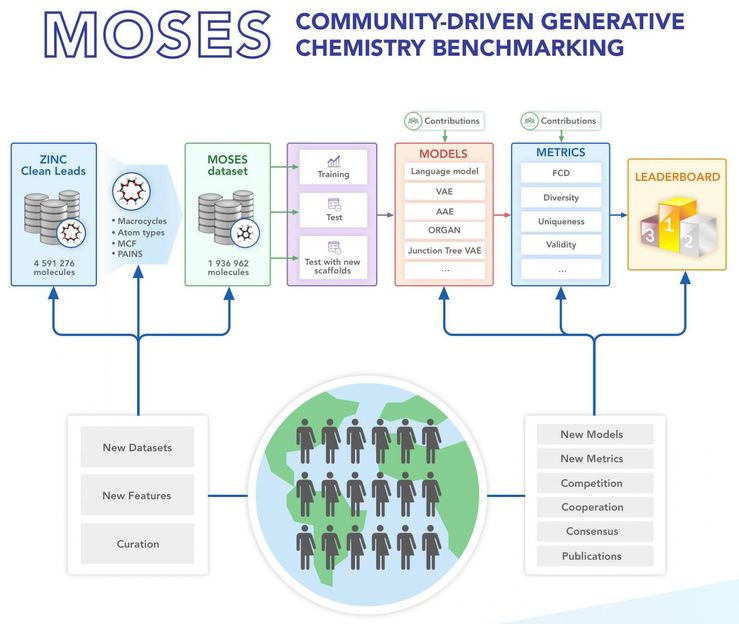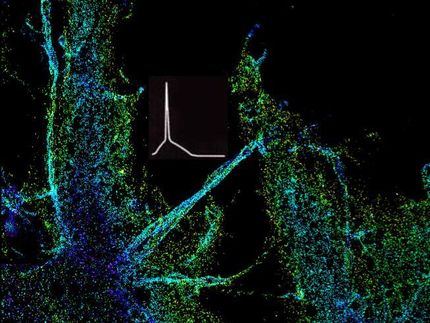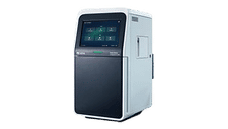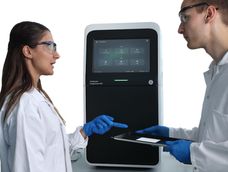AI researchers join forces to develop the 'ImageNet' of generative drug discovery
Advertisement
insilico medicine, an artificial intelligence company developing an end-to-end drug discovery pipeline for age-related diseases, announced an open research collaboration. Researchers are invited to contribute to the new platform MOSES (Molecular Sets), described in the paper titled "Molecular Sets (MOSES): A Benchmarking Platform for Molecular Generation Models". The code and the paper are available at the GitHub repository.

Insilico Medicine contributes to the new platform MOSES (Molecular Sets), A Benchmarking Platform for Molecular Generation Models.
Insilico Medicine
The original benchmarking platform is a result of collaboration between Insilico Medicine, Neuromation, and Alán Aspuru-Guzik's laboratory. The researchers and teams are invited to contribute their datasets and models to extend the benchmarking platform.
The paper introduces Molecular Sets (MOSES) -- a benchmarking platform that encompasses various machine learning techniques, in order to compare them on a standard dataset. MOSES implements several popular molecular generation models and ranks them, according to a predefined set of metrics. MOSES aims to increase the pace of drug discovery and facilitate sharing and comparison of new models. MOSES is supposed to boost AI-powered drug discovery, just as ImageNet boosted deep learning for imaging data.
The ongoing research in machine learning, in particular, deep learning, brings up the issues of reproducibility and fair comparison of different approaches. While there are multiple methods for generating novel molecular structures with machine learning models, there is no conventional way to run and evaluate the performance of these generative models. The MOSES platform provides a standardized benchmarking dataset, a set of open-sourced models with unified implementation, and metrics to evaluate and assess the results of generation.
"When we started the journey in generative chemistry using GANs in 2015, it was rather exotic and unproven technology. Today it is experimentally-validated and the field is exploding with many groups joining and making meaningful contributions. We believe that it is important to develop a set of standards and benchmarks to help the community, to accelerate the delivery of AI-generated drugs to the patients", said Alex Zhavoronkov, Ph.D., founder, and CEO of Insilico Medicine.
"At Insilico Medicine, we take reproducibility and fair evaluation of machine learning models very seriously. Growing popularity of generative AI applications in drug discovery dictates a need for a standardized benchmarking platform supported and maintained by the research community. With MOSES, we come one step closer to the ultimate goal of disrupting the industry with better drug compounds produced by advanced computational and machine learning methods", said Alexander Zhebrak, CTO of Insilico Medicine.
"I am happy to announce this research collaboration on behalf of Neuromation. Here at Neuromation, we are trying to bring cutting edge results from deep learning to many fields, with healthcare being among our top priorities. MOSES is a benchmarking platform that has the potential to become an industry standard for generative models in biochemistry; developing it has been an exciting road for us and a wonderful opportunity to work together with Insilico Medicine," said Sergey Nikolenko, Ph.D., Chief Research Officer of Neuromation.


























































